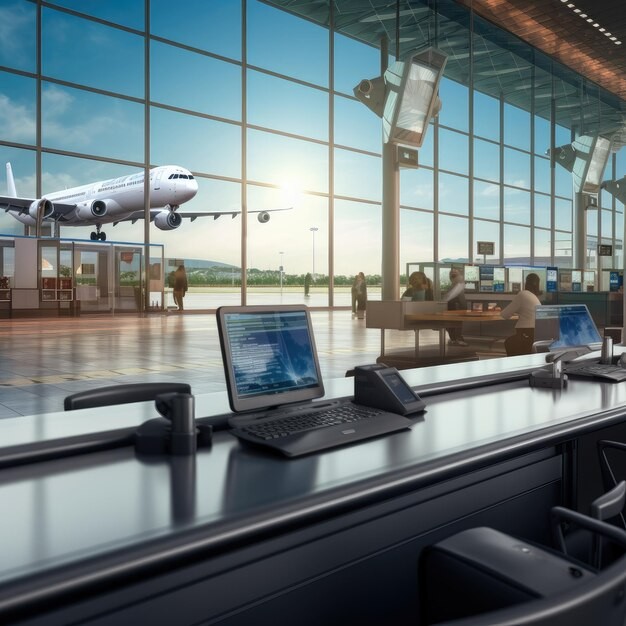Advanced Airport Technologies Market Uses and Benefits

The Global Advanced Airport Technologies Market Size collected USD 27.2 Billion in 2022 and is set to achieve a market size of USD 45.3 Billion in 2032 growing at a CAGR of 4.8% from 2023 to 2032.
The global aviation industry is undergoing a transformative phase driven by the adoption of advanced technologies aimed at enhancing operational efficiency, passenger experience, and security. The advanced airport technologies market encompasses a wide array of innovations including biometrics, artificial intelligence, the Internet of Things (IoT), automation, and data analytics. This article explores the uses and benefits of these technologies, highlighting their impact on modern air travel.
According to Acumen Research and Consulting, The Global Advanced Airport Technologies Market Size collected USD 27.2 Billion in 2022 and is set to achieve a market size of USD 45.3 Billion in 2032 growing at a CAGR of 4.8% from 2023 to 2032.
To Know More: https://shorturl.at/k3OPa
Key Technologies in the Market
1. Biometric Systems
Biometric technologies, such as facial recognition and fingerprint scanning, are revolutionizing the way passengers interact with airport processes. By automating identity verification, these systems significantly reduce wait times at check-in, security checks, and boarding.
2. Artificial Intelligence (AI)
AI-driven systems are increasingly utilized for predictive analytics in flight scheduling, baggage handling, and crowd management. Machine learning algorithms can analyze vast amounts of data to forecast delays and optimize resource allocation.
3. Internet of Things (IoT)
IoT devices, including smart baggage tags and connected airport infrastructure, enhance real-time tracking and monitoring. These technologies improve operational efficiency by providing insights into asset utilization and passenger flow.
4. Automation and Robotics
Automated check-in kiosks, self-bag drop stations, and security robots are becoming commonplace in airports. These innovations reduce the reliance on human staff and minimize human error, leading to streamlined operations.
5. Data Analytics
Big data analytics allows airports to glean insights from various data sources, enabling informed decision-making. Airports can analyze passenger behavior, optimize terminal layouts, and enhance service delivery based on real-time data.
Advanced Airport Technologies Market Segmentation
The worldwide advanced airport technologies market is categorized based on type, and geography.
Advanced Airport Technologies Market By Type
- Airport Communications
- Airport Management Software
- Car Parking Systems
- Passenger, Baggage, and Cargo Handling Control Systems
- Airport Digital Signage Systems
- Landing Aids, Guidance, and Lighting
Advanced Airport Technologies Market Players
Some of the key players in the global advanced airport technologies market include ActivIdentity Corp., A4 Vision, Inc., American LaFrance Corp., Alstom Aerospace Airports Ltd., Aeronautical Radio, Incorporated (ARINC), Analogic Corp., Cisco Systems, Inc., Bosch Security Systems, Inc., Syagen Technology, Inc., Siemens Airports, Rockwell Automation, and Vanderlande.
Benefits of Advanced Airport Technologies
1. Enhanced Passenger Experience
The integration of advanced technologies significantly enhances the passenger journey. Faster check-in and security processes reduce stress and waiting times, while personalized services based on data analytics create a more enjoyable travel experience.
2. Improved Operational Efficiency
Automating various airport functions allows for better resource management. AI and IoT solutions provide real-time data that enable airports to respond swiftly to operational challenges, ensuring smooth flow and minimizing delays.
3. Cost Reduction
By reducing the need for extensive manpower and optimizing resource use, advanced technologies lead to substantial cost savings. Efficient baggage handling and streamlined operations further contribute to financial benefits.
4. Increased Security
Advanced security technologies, including biometric systems and AI-driven surveillance, bolster airport security. These systems enhance threat detection and response capabilities, ensuring a safer travel environment for passengers.
5. Sustainability Initiatives
Many advanced airport technologies promote sustainability. IoT-enabled systems help monitor and reduce energy consumption, while automated processes minimize waste and improve overall operational sustainability.
Challenges and Considerations
While the benefits of advanced airport technologies are numerous, there are challenges that stakeholders must address. Data privacy and security concerns surrounding biometric and personal data collection need to be managed carefully to maintain passenger trust. Additionally, the high initial investment required for technology implementation can be a barrier for some airports, particularly in developing regions.
Conclusion
The advanced airport technologies market is rapidly evolving, presenting exciting opportunities for innovation in the aviation sector. By enhancing passenger experience, improving operational efficiency, and ensuring security, these technologies are poised to reshape the future of air travel. As airports continue to embrace these advancements, the industry will not only meet the demands of a growing passenger base but also pave the way for a more sustainable and efficient travel ecosystem.
Source: https://www.acumenresearchandconsulting.com/advanced-airport-technologies-market

